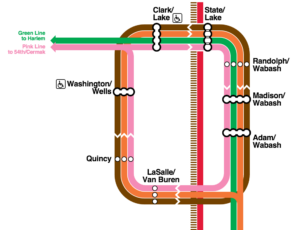 Can we evict?
Can we evict?
I get the phonecalls from landlords every day. “I hear we can evict tenants again – is that true?” Hmm… that’s a simple question that requires a nuanced answer. It is true that on October 4, 2021, the eviction moratorium was lifted, but what replaced it is a system that pre-covid landlords (and their attorneys) might not recognize. A system that was flawed could arguably be said to be purposefully broken. We couldn’t evict (except in rare circumstances) before the moratorium ended. Now, with the moratorium lifted, we face a system that seems almost designed to slow the process and is already in need of significant reform. Here’s a “state of the union” for evictions in Cook County’s 1st district:
Return Dates
When a case is filed in the Daley Center, a return date (an initial court date) is issued by the Circuit Court. Before Covid-19, we would routinely be give a return date that was 14 days after a case was filed. If we were able to get service of process on the tenant, something would happen on that return date – a default eviction order entered, a tenant would appear and ask to file an answer or to get an attorney, or a bench trial might take place. Upon the lifting of the moratorium, we found that two week return dates had gone away, replaced by 28 day return dates. In the last few weeks, we have seen return dates of between 60 to 90 days. That’s right. If you file a Chicago eviction case today, you are likely to have to wait a minimum of 60 days before you get to see a judge. To add insult to injury, if we filed two evictions for the same landlord, one right after the other, they used to be assigned, if not to the same courtroom, at least the same return date. That is no longer the case, so filing multiple evictions at the same time does not allow us to maximize the efficiency of our efforts. Is all of this purposeful? Is this because there are so many cases pending? I’m not sure. What I do know is that this delay just adds more time to the process and, accordingly, more lost income to the landlords.
Cattle Calls
Before Covid-19, a filed case would be assigned to one of four 14th floor eviction courtrooms. Now, the Circuit Court seems to have created a single “hub” in the courtroom in 1302. All cases now seem to originate there. And what’s the result of that policy? Huge  court calls that begin at 9am and run into the afternoon, some going five hours while others go seven or eight hours. That’s right. We sit in zoom court for hours waiting for a case to be called. Think of courtroom 1302 as the L train station at State and Lake. You can be in room 1302 for an initial court appearance, a contested continuance, an ERP status matter (the Early Resolution Program of mediation), or just a transfer between courtrooms. All of those cases are heard in Courtroom 1302 and the Judges give those matters the attention they require which results in long, long court calls.
court calls that begin at 9am and run into the afternoon, some going five hours while others go seven or eight hours. That’s right. We sit in zoom court for hours waiting for a case to be called. Think of courtroom 1302 as the L train station at State and Lake. You can be in room 1302 for an initial court appearance, a contested continuance, an ERP status matter (the Early Resolution Program of mediation), or just a transfer between courtrooms. All of those cases are heard in Courtroom 1302 and the Judges give those matters the attention they require which results in long, long court calls.
ERP Program
The ERP Program or “Early Resolution Program” was designed to allow for mediation between landlords and tenants. When a case is filed, Cook County landlords must attach a  summary form describing the program to their summons (a portion of that form is in the image to the left). The mediation program is mandatory. While the ERP program has certainly helped to resolve some matters between landlords and tenants, there are tenants who utilize the system to slow the eviction process. Those tenants agree to enter the program and attempt mediation. They then barely participate in the program. That results in multiple continuances in Courtroom 1302 before the case is sent over to a trial court for a prove-up or an eviction trial. Gone now are the days of one or two week continuances. Most are three or four weeks. Two or three such continuances can cost a landlord months of time in the process. Once the case leaves the mediation process, if there is going to be a default in the case, a prove-up is scheduled for 2 to 4 weeks into the future and it can take even longer to get a trial date if one is necessary.
summary form describing the program to their summons (a portion of that form is in the image to the left). The mediation program is mandatory. While the ERP program has certainly helped to resolve some matters between landlords and tenants, there are tenants who utilize the system to slow the eviction process. Those tenants agree to enter the program and attempt mediation. They then barely participate in the program. That results in multiple continuances in Courtroom 1302 before the case is sent over to a trial court for a prove-up or an eviction trial. Gone now are the days of one or two week continuances. Most are three or four weeks. Two or three such continuances can cost a landlord months of time in the process. Once the case leaves the mediation process, if there is going to be a default in the case, a prove-up is scheduled for 2 to 4 weeks into the future and it can take even longer to get a trial date if one is necessary.
Pleading Requirements
If you have followed this blog in the past, you probably already know that the size of an eviction complaint has ballooned after Covid-19. We now must include a copy of the five day notice and affidavit of service of the notice with the complaint along with a copy of the lease. For any documents we don’t have, we need to submit an affidavit explaining what those documents are and why they are unavailable. Eviction complaints used to be, in line with the summary nature of an eviction proceeding, short documents. They now look like a book.
Court Orders
Before an eviction order can be placed with the Sheriff, a certified copy of that order needs to be obtained to be delivered to the Sheriff. During the pandemic and beyond, we are having a horrible time getting copies of court orders that are entered in eviction cases. Sometimes it can take upwards of six or seven weeks before an order comes into our possession from the Court. It is my understanding that the pandemic has created a large backlog in the order processing departments of the Circuit Court.
Endgame
So what is the result of all of this? Time. And for landlords, time is money. In the post-Covid-19 world, evictions are not quick. They are not cheap. They are not easy. Whether purposeful or by happenstance, the post-Covid-19 eviction process is more cumbersome, more complex, and more tedious than before the pandemic. That means longer waits and higher attorney fees. I wish that wasn’t the case, but it is. I haven’t even delved into a number of other issues that must currently be considered by an eviction attorney (30 days notice under the CARES Act, the implications of the Fair Notice Amendment, the different requirements of the various Cook County, Chicago, Evanston, and Mt. Prospect landlord tenant ordinances, etc.) and all of it adds up to a tough time to be a landlord in (take your pick): Cook County, Chicago, or Illinois.
